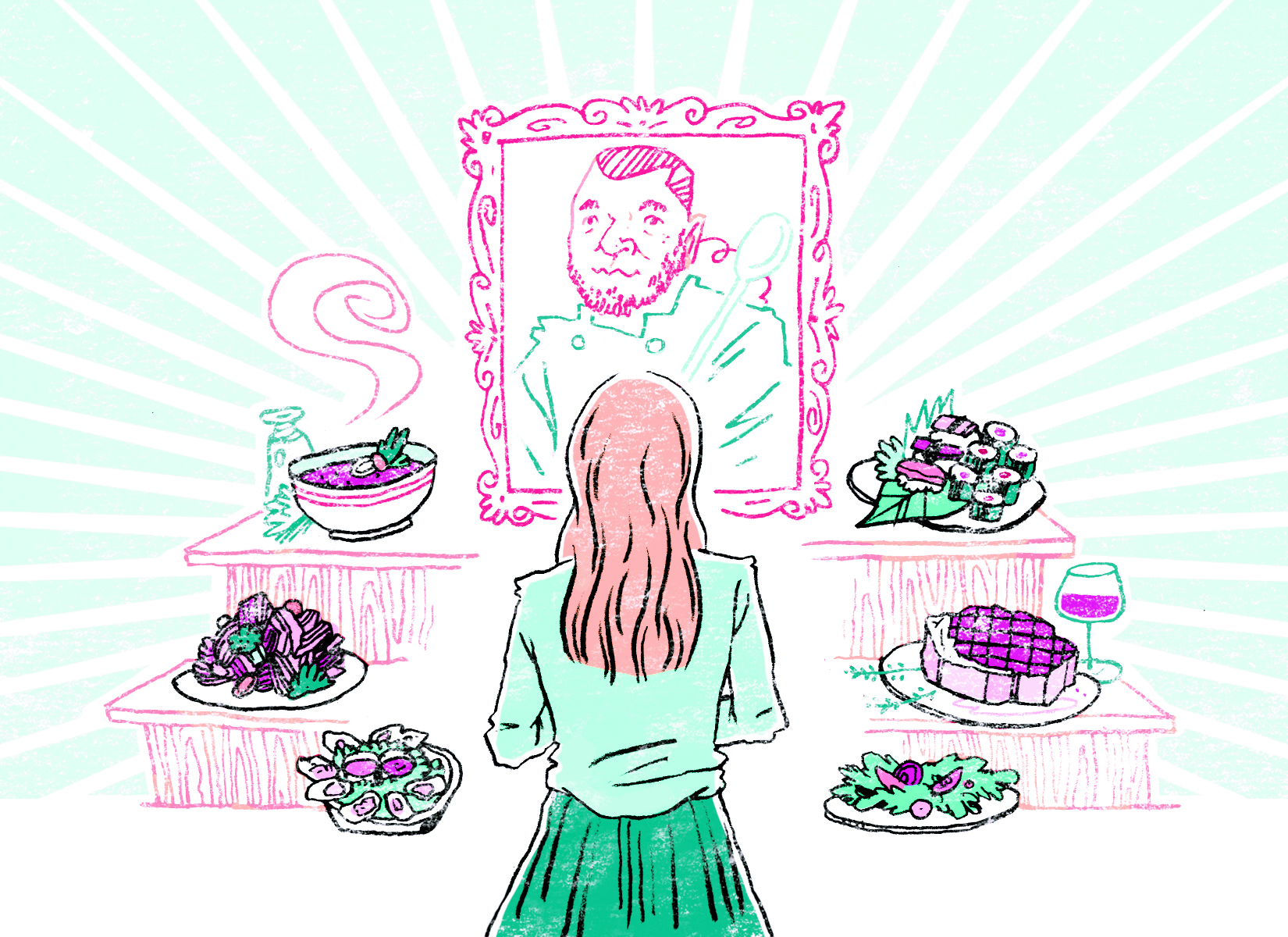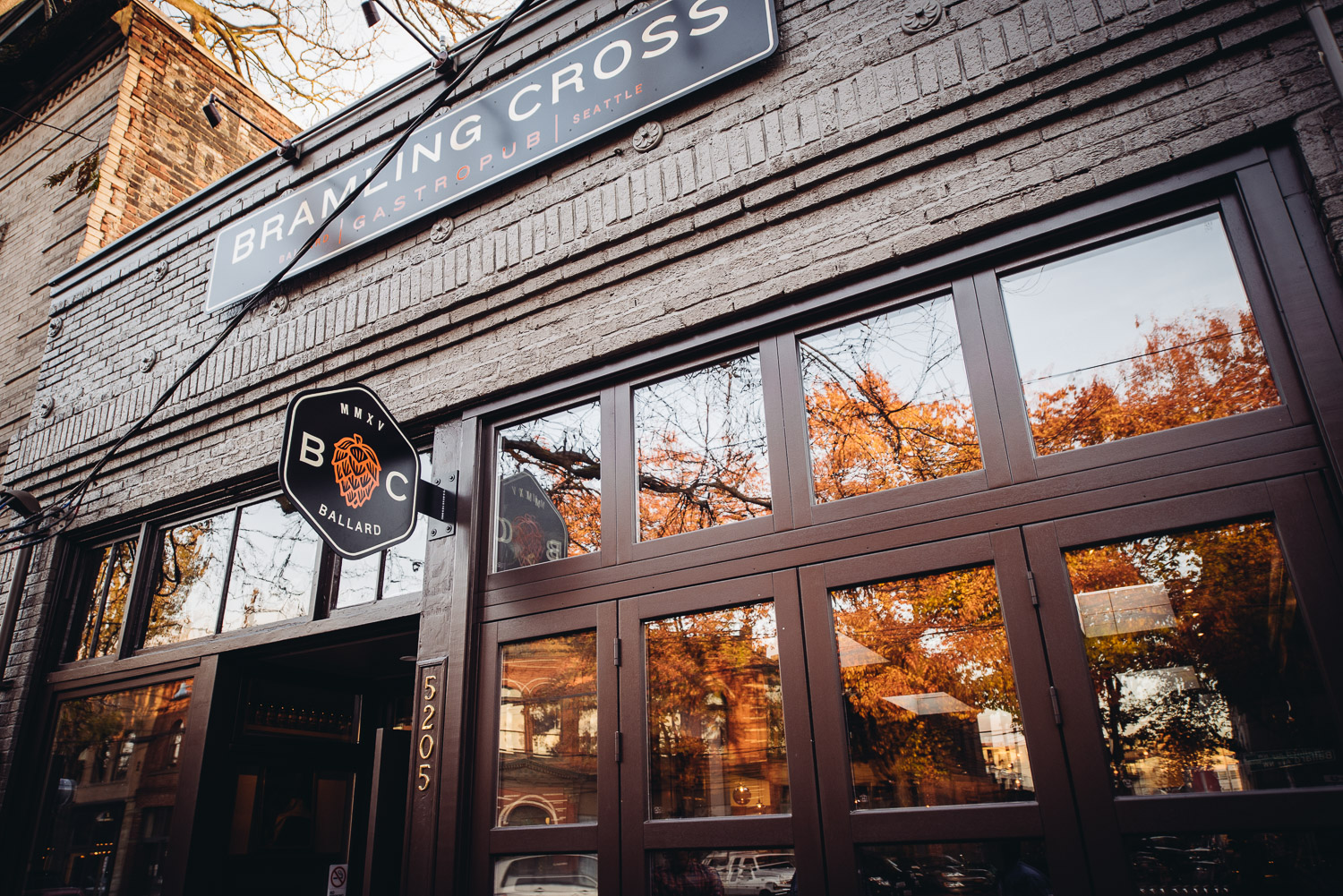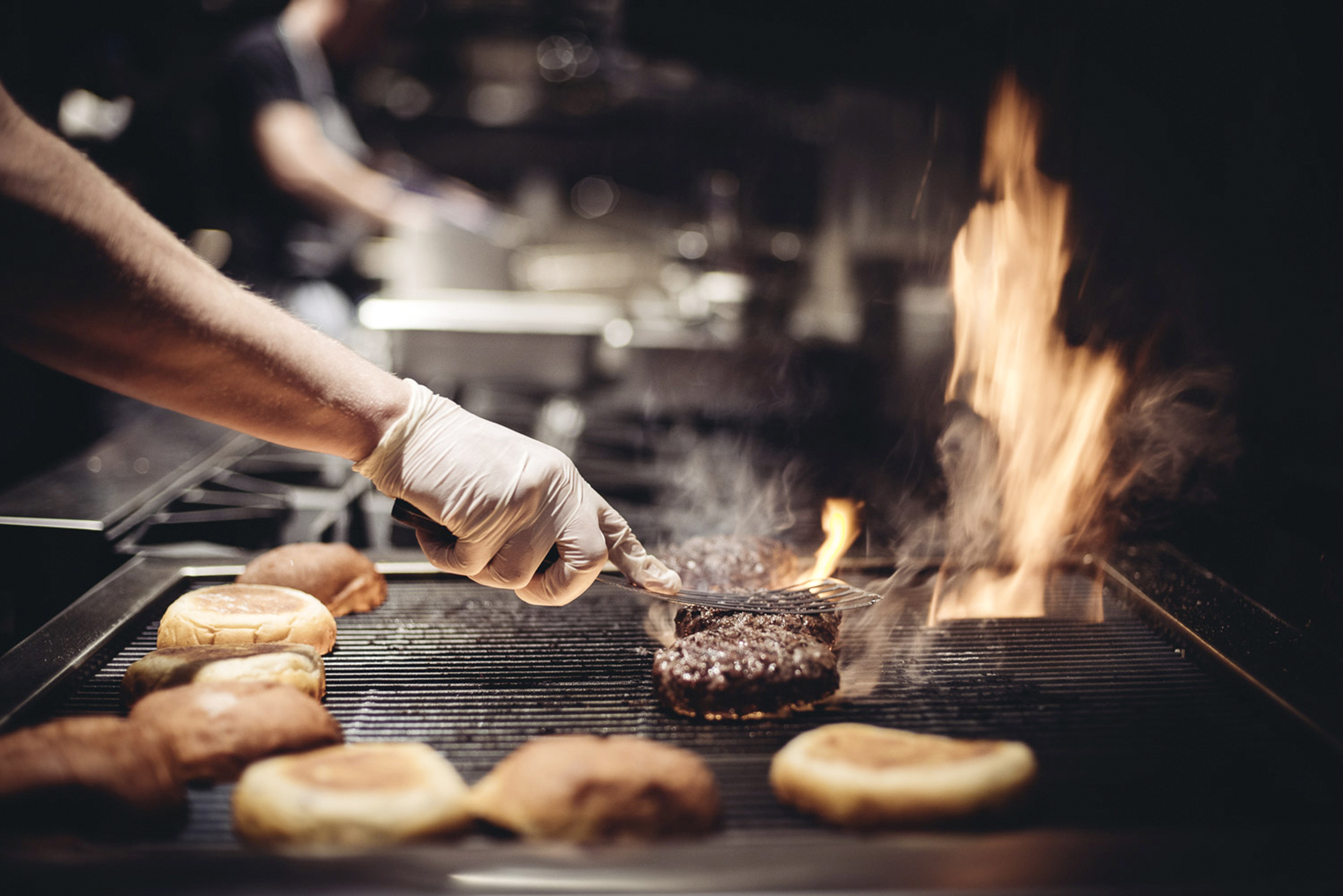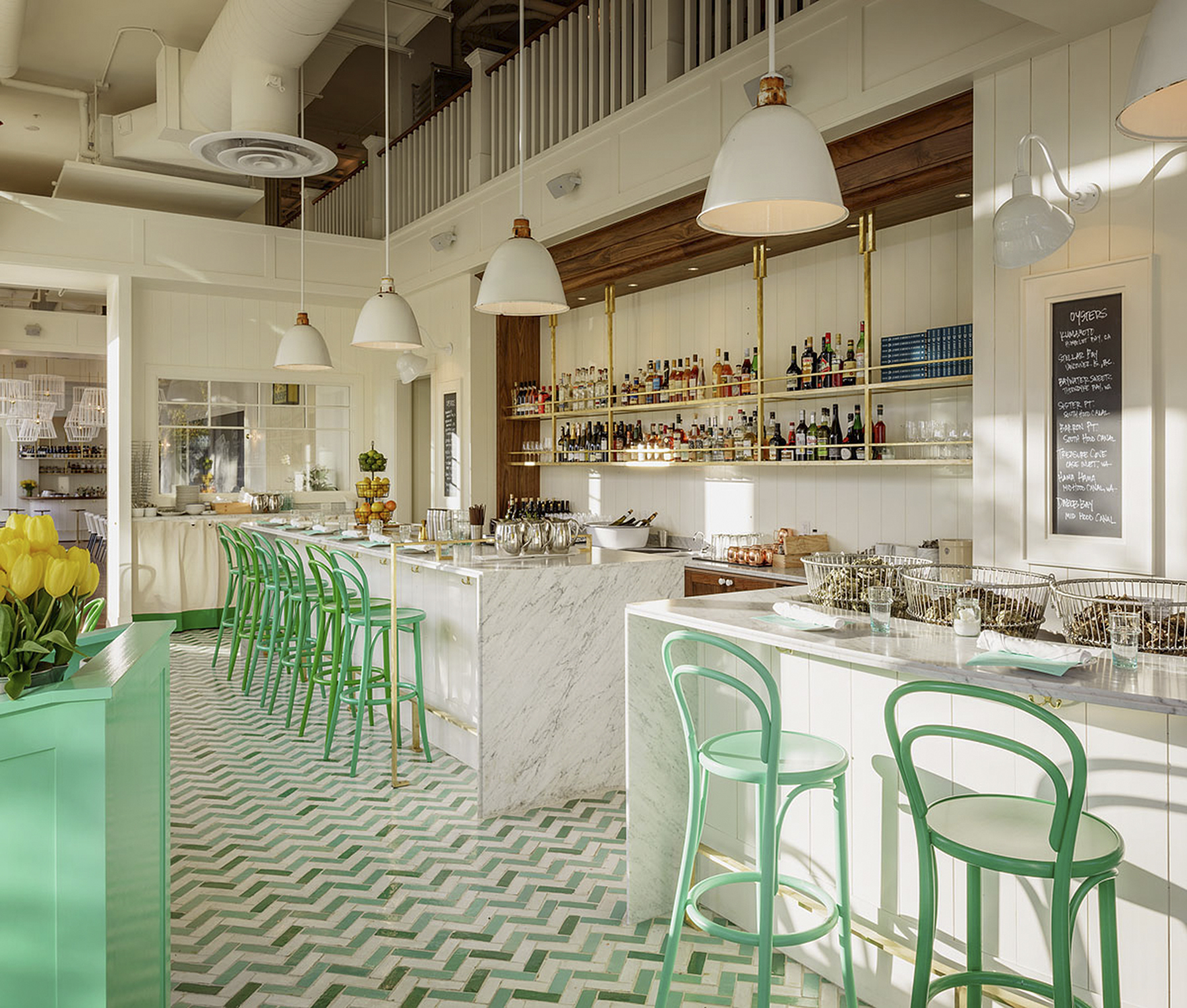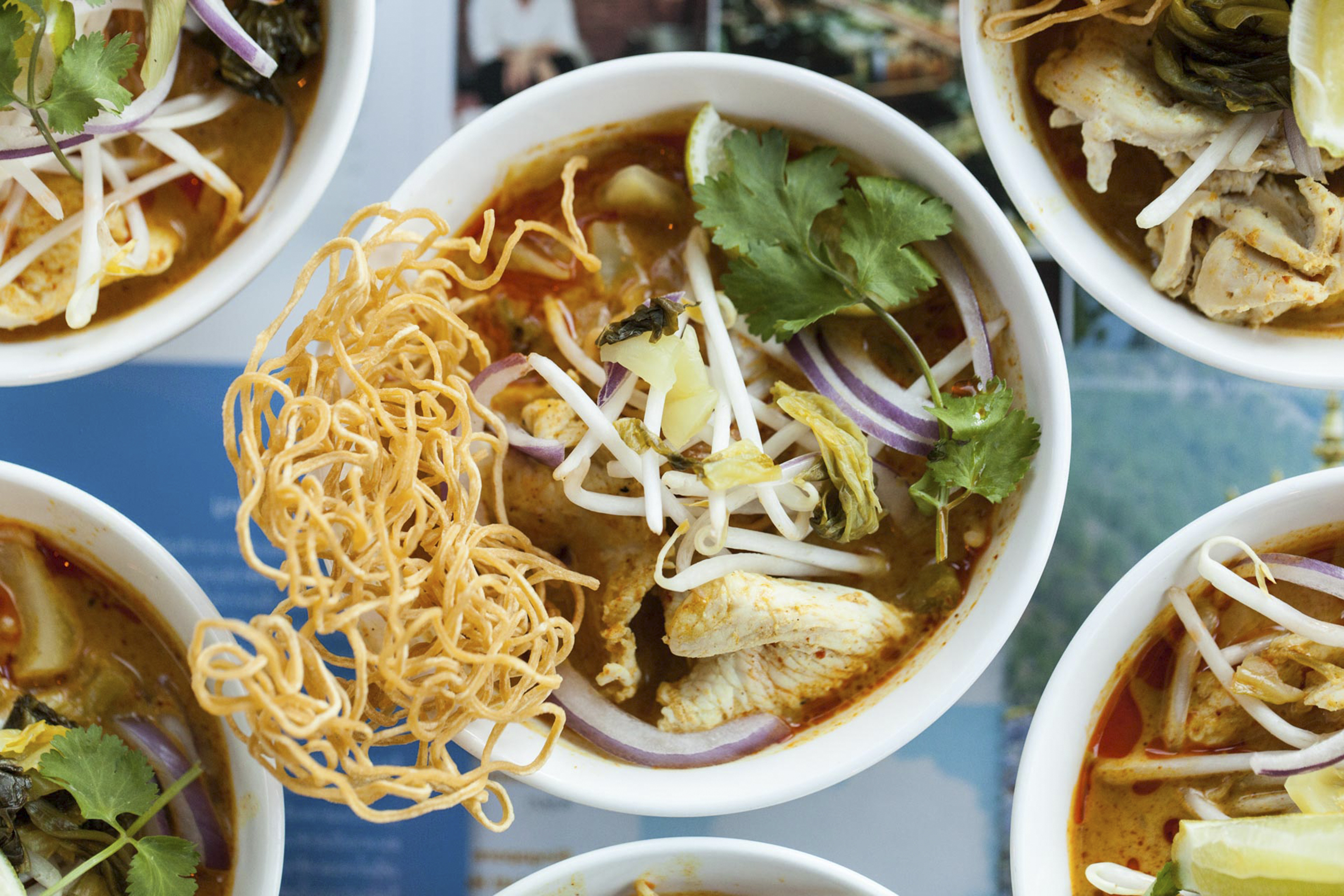Most of the people
who want to cook for a living don’t really want to cook for a living, they want to be on TV, or they want to rule the world, I can’t tell anymore. People are too jacked up on food and cooking anyway. Please, everyone, just make yourself some nice pork chops for dinner and calm the hell down.
—Gina DePalma, former pastry chef at Babbo Ristorante and Enoteca
I recently read this quote
on a friend’s Facebook feed, and found it equal parts refreshing and offensive. Refreshing in that, yes, I’m sick of chefs who are more concerned with being on TV or opening a zillion restaurants than with cooking good food in their kitchens, and of this cult of personality that makes us give a shit about what a chef wears or what her house looks like or what he dreamed about last night. I also get peeved at people constantly taking photos of their food in restaurants; just eat and enjoy it! But as someone who makes her living writing about restaurants and chefs, and who does so because of an authentic love and admiration for food and the people who create it, DePalma’s tirade struck a nerve.
Sure, I laughed at her sardonic declaration for everyone to calm down and make some “nice pork chops,” but the truth is, we as a society have come to care a lot about what we feed ourselves—and that’s hardly a bad thing. Those pork chops are something I grew up on, and they were generally overcooked, certainly not organic, and typically served with a mushy vegetable and an anemic salad. Now we have a slew of beautiful ingredients at our disposal and an army of cookbooks (and TV shows) to inspire us.
DePalma’s own web site, ginadepalma.net, is about food—recipes, photographs, and her culinary musings. She’s certainly had a hand in perpetuating food zealotry. She was a columnist for many years at Serious Eats, and has her own cookbook, Dolce Italiano: Desserts from the Babbo Kitchen—which includes a foreword from Mario Batali, arguably the ultimate celebrity chef. DePalma had better hope we don’t just all go home and make ourselves pork chops.
While DePalma stands by her quote, she also adds that the current fascination with food is surreal to her. “I’m Italian, and I grew up in a household where food was taken seriously but not self-consciously.” Having a good meal, she says, was as important as keeping the house clean. “I thought we were the norm, not the exception . . . so it’s strange for me that people are so amazed by good food.”
When I stumbled on her quote, I was thinking of something much more complicated than chef sensationalism, however. A few months back, one of my best friends from junior high friended me on Facebook. Hannah (not her real name) and her family moved away from my rural Maryland town at the start of high school, decades ago, and I haven’t seen her since. “Reconnecting,” I learned that she now lives out West, that she’s a lesbian who just married her partner, and that’s she’s a psychologist. The lesbian part, in particular, struck me since we’d both “dated” the same guy in middle school.
While our friendship was brief, it had been deep—full of early teenage angst that we indulged by writing poetry and sharing our “works” with each other, through amateur photography, and by marathon Depeche Mode and The Cure listening sessions. We were moony teens, and we had intensely girl-crushed on each other. It was a charmed time.
One day on Facebook, for a “Throwback Thursday,” Hannah posted a black-and-white photograph she’d taken of my mom and me on my 13th birthday. I hadn’t wanted a party; just for me, my mother, and Hannah to spend an afternoon at the Inner Harbor in Baltimore. We walked around, shopped, had dinner in Little Italy. It was a perfect day. The picture was such a surprise; I’d never seen it. My hair is all ’80s fluff, my smile guileless, my mother thin and pretty, beaming happily even though she’d just gone through a divorce. In fact, that’d been a very hard time for both me and my mom, and Hannah had been the friend who helped me get through my parents’ parting. I cried when I saw the picture.
A few months later,
Hannah e-mailed. She was coming to Seattle in just a couple weeks, but not for business or pleasure. She was coming to the Seattle Cancer Care Alliance for a double mastectomy—she had breast cancer. Afterward, she wrote, she’d be back home for rounds of chemo and radiation. She had a favor to ask me. Where should she and her partner have dinner in Seattle the night before her surgery? She said she was looking upon that meal as her “last supper,” assuming it would be many, many months before she felt well and strong again or had an appetite. She wanted to relish a meal as her healthy, pre-cancer-treatment self. She also had some tough criteria: Not only is she a vegetarian, but there were quite a few ingredients she couldn’t eat before the operation. And, the clincher, the establishment had to be open on the Sunday before her procedure.
As a food writer, I constantly get requests from friends and acquaintances about where to eat. I always find it a challenging question unless I truly know the person well. But this was by far the toughest recommendation I’d ever made—and probably ever will. After I digested the terrible news, I started brainstorming. I’m not a vegetarian, but I know which vegetarian restaurants are the best, and which non-vegetarian restaurants offer good non-carnivorous alternatives. I also e-mailed a vegetarian colleague for suggestions.
But just throwing my friend a list felt flimsy and unworthy of the task she’d entrusted to me. I needed to send her somewhere I truly loved; that I believed would feed her well and treat her with care. That would give her the glorious meal she was so intent on having. She clearly did not want to stay home and make herself a pork chop. Rather, she wanted to be catered to, to taste vividly, to experience the particular gratification one can get from a meal lovingly crafted by pros.
My first thought was the vegetarian tasting menu at Canlis; it had the view, the cred, the dietary requirements—but wasn’t open Sundays. All the better, because it made me think more intently. Finally, it came to me. I told her, unequivocally, that she should go to Poppy on Capitol Hill. Not only do I love the Indian-farm-to-table-fusion style of the food, but it always seems as if it’s been plucked straight from the natural world: its scents and textures and tastes so thoroughly emblematic of each season, the expert use of their back garden herbs penetrating each thali in just the right measure. Since Hannah was coming in summer, I knew also that she could sit outside on the back deck surrounded by beautiful, heady-smelling plants and flowers and herbs, and that the kind and well-versed staff would add the right dose of contentment to her experience. We have so many wonderful restaurants in Seattle, but Poppy is the one place that manages to move even my most jaded New York friends. It’s where I almost always choose to go when I don’t have to be at a certain restaurant for work purposes. It’s as happy as its name.
Off my recommendation went, and back came her reply: “My, Poppy looks perfect! So cheerful & yummy. And I love the Miro-esque mobile logo. I’m making reservations!”
I didn’t receive an invitation to dinner, but was invited to join the care-community website her sister set up for her—a place for friends and family to get updates on Hannah’s surgery and post-healing. I signed up immediately, touched and grateful to be included. Through finding her a coveted meal, I’d joined her inner circle.
She has since had the surgery,
and I’ve been following her updates—from what she’s eating and reading to how she cried when she had to cut her trademark long, thick hair. I send hopeful comments (the kind that are always so damn hard to write). I have no idea if she ended up going to Poppy, and if so, whether she enjoyed it; I’m certainly not about to ask on a forum where each day she details whether she’s able to get out of bed or not.
Regardless, I feel soothed about my recommendation, knowing it came from a place of profound care and responsibility—that through my own adulation of our culinary creators, I was maybe able to offer her an evening that excited her likely soon-to-be-weakened taste buds and soothed her pre-op anxiety. Such is the power a great chef can wield. I hope that when she’s better, she comes back and we can share a meal—maybe at Poppy, maybe somewhere else I’m newly excited about.
And while the controversy about foodie culture continues, I’ll keep reminding myself why I do what I do. And if I too have been subconsciously harboring irritability with the food-worshipping culture we’re immersed in, I’m now a whole lot less wearied by it.
nsprinkle@seattleweekly.com
